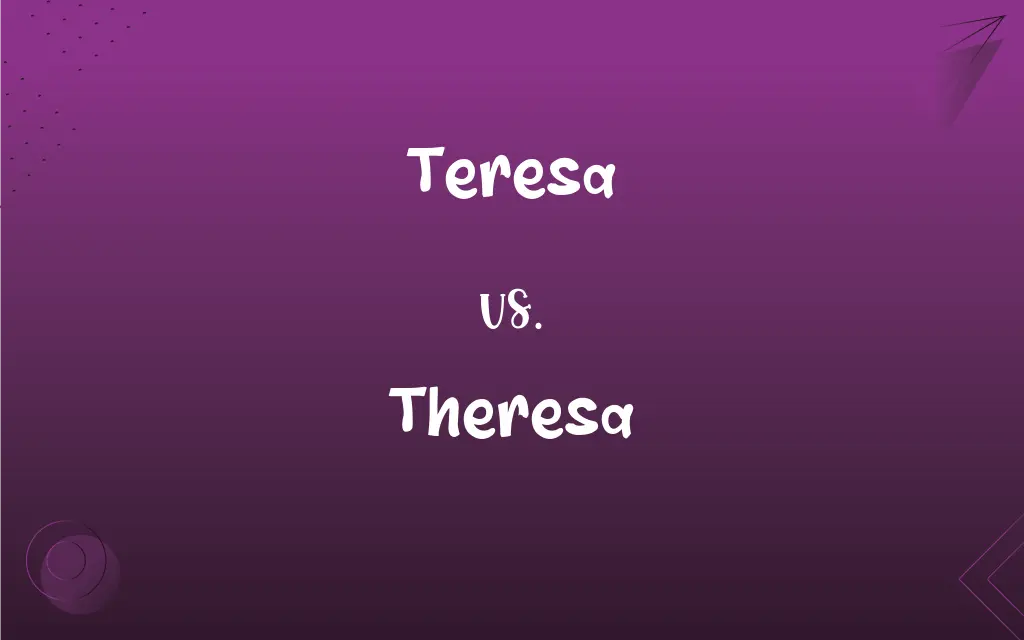Teresa vs. Theresa: What's the Difference?
By Aimie Carlson & Janet White || Updated on March 4, 2024
Teresa is a given name derived from the Greek word for "harvest" or "hunter," while Theresa's origins are less clear, often associated with the Greek island of Thera.

Key Differences
Teresa is a name of Greek origin meaning "harvest" or "hunter," commonly associated with simplicity and warmth. On the other hand, Theresa, while similar in pronunciation, often carries a more formal tone and its origin is debated, with some linking it to the Greek island of Thera or the Greek word for "huntress."
Teresa is often perceived as more modern and accessible, whereas Theresa is seen as more traditional and formal. This distinction is reflected in various cultural references and public figures bearing these names, with Teresa often used in more contemporary settings.
The choice between Teresa and Theresa can also be influenced by familial, cultural, or regional preferences, with different spellings favored in different communities.
Comparison Chart
Origin
Greek, meaning "harvest" or "hunter"
Debated, possibly Greek island of Thera
Tone
Simpler, more modern
More formal, traditional
ADVERTISEMENT
Cultural Associations
Associated with warmth and accessibility
Often linked to tradition and formality
Common Usage
More common in contemporary settings
Favored in more traditional contexts
Variations
Less likely to have variations
May have variations like "Tess" or "Tessa"
Teresa and Theresa Definitions
Teresa
A female given name meaning "harvest" or "hunter."
Teresa has always loved the simplicity of her name.
Theresa
May carry a more formal tone compared to Teresa.
Theresa always appreciated the formal undertone of her name.
ADVERTISEMENT
Teresa
Often associated with warmth and approachability.
Teresa's name suits her friendly nature.
Theresa
Conveys a sense of tradition and formality.
Theresa's name reflected her love for classic literature.
Teresa
Can be a name chosen for its modern feel.
They named their daughter Teresa for its contemporary resonance.
Theresa
A female given name with debated origins, possibly linked to the Greek island of Thera.
Theresa often wondered about the history of her name.
Teresa
Sometimes chosen for its simplicity and ease of pronunciation.
They opted for Teresa to avoid any pronunciation issues.
Theresa
Often found in traditional contexts or historical references.
Theresa was named after her grandmother, continuing the family tradition.
Teresa
Less commonly linked to formal or traditional settings.
Teresa preferred a casual gathering over a formal event.
Theresa
Can have variations like "Tess" or "Tessa," adding to its versatility.
Although her name was Theresa, her friends called her Tess.
Teresa
(obsolete) A type of light lady's kerchief in the late eighteenth century.
Theresa
Indian nun and missionary (born in Albania) dedicated to helping the poor in India (1910-1997)
Teresa
Indian nun and missionary (born in Albania) dedicated to helping the poor in India (1910-1997)
FAQs
Can Teresa and Theresa be considered the same name?
While similar, cultural and personal perceptions can differentiate them significantly.
Is Teresa considered more modern than Theresa?
Yes, Teresa is often viewed as more modern and accessible.
Can the choice between Teresa and Theresa reflect cultural preferences?
Yes, the choice can be influenced by familial, cultural, or regional traditions.
How does Theresa differ from Teresa in origin?
Theresa's origin is less clear, often linked to the Greek island of Thera or considered a variation of Teresa.
Which name is more formal, Teresa or Theresa?
Theresa is often perceived as more formal and traditional.
Are Teresa and Theresa pronounced the same?
Pronunciation can vary regionally, but they are often pronounced similarly.
What variations might Theresa have?
Theresa might have variations like Tess or Tessa.
Does the meaning of Theresa differ significantly from Teresa?
The meanings can vary due to the debated origins of Theresa, but both carry a sense of warmth and depth.
What is the meaning of Teresa?
Teresa means "harvest" or "hunter," originating from Greek.
What cultural associations does Teresa have?
Teresa is associated with warmth, simplicity, and modernity.
What is the significance of the name Theresa in history?
Theresa has been borne by several historical figures and saints, giving it a traditional and formal association.
Are there any literary references that distinguish Teresa from Theresa?
Literature may use the names to signify different eras, personalities, or cultural backgrounds.
How do personal perceptions influence the choice between Teresa and Theresa?
Personal perceptions of formality, tradition, and modernity can significantly influence the choice.
How do Teresa and Theresa reflect individual identities?
The choice of name can reflect personal or family values, cultural heritage, and individual identity.
What advice would you give to parents choosing between Teresa and Theresa for their child?
Consider the cultural, familial, and personal significance, as well as the desired connotations and pronunciations.
Can the spelling of Teresa or Theresa affect its pronunciation?
Yes, regional and cultural variations can influence pronunciation, despite similar spellings.
How do families decide between naming a child Teresa or Theresa?
Decisions can be based on family traditions, personal preferences, or the desired connotation.
Are there any notable public figures with the name Teresa?
Yes, there are several, including Mother Teresa, known for her humanitarian work.
Is Teresa a popular name in contemporary times?
Teresa remains a popular choice, particularly for its modern and simple appeal.
Is there a religious significance to the names Teresa or Theresa?
Both names have been borne by Catholic saints, adding a layer of religious significance.
About Author
Written by
Aimie CarlsonAimie Carlson, holding a master's degree in English literature, is a fervent English language enthusiast. She lends her writing talents to Difference Wiki, a prominent website that specializes in comparisons, offering readers insightful analyses that both captivate and inform.
Co-written by
Janet WhiteJanet White has been an esteemed writer and blogger for Difference Wiki. Holding a Master's degree in Science and Medical Journalism from the prestigious Boston University, she has consistently demonstrated her expertise and passion for her field. When she's not immersed in her work, Janet relishes her time exercising, delving into a good book, and cherishing moments with friends and family.































































